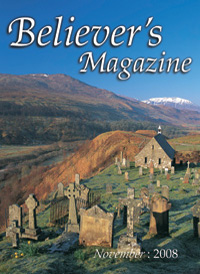Solomon was a remarkable ruler, and his fame has not yet died away. His foolish successor, Rehoboam, spoke roughly to the people when they pleaded for lighter burdens. He told them that his little finger would be thicker than his father’s loins. He should not have been surprised when the nation refused to be thus bullied. The sad disruption followed which has not been healed to this day.
About a thousand years later we hear the Lord Jesus speaking in the same land. He came (after the flesh) of the line of Solomon and Rehoboam. No kingly glory was displayed in Him. He was poor and needy. He will yet reign in Zion, but His reign will be marked by benevolence, not oppression. When He came the first time it was in lowly grace. As the only-begotten Son who is in the bosom of the Father, He declared the Father’s love. "His lips like lilies, dropping sweet-smelling myrrh", are words written long before His birth by His renowned predecessor, Solomon (Song 5.13). He demanded nothing from the people, but He fed hungry multitudes lavishly; they wished to make Him king because of this, for a king who would give to the people, rather than take from them, would be a great advantage (Jn 6.15).
In Matthew 11, we find our Lord in painful circumstances. He was despised amongst a people who should have honoured Him, but He made no complaint but submitted with joy to the Father’s will. The path He was treading was the Father’s appointment for Him, and that was enough. He commended this path to others. In the midst of a world of unhappy and discontented people He said, "Come unto me, all ye that labour and are heavy laden, and I will give you rest" (Mt 11.28).
This is more than freedom from the condemnation of sin; it is rest from self-will and discontent, in the assurance of the Father’s changeless love, and in the confidence that His will is perfect and best for us all. This is rest indeed.
But the life of faith and obedience needs to be instructed and directed, hence the Lord added, "Take my yoke upon you, and learn of me; for I am meek and lowly in heart: and ye shall find rest unto your souls. For my yoke is easy, and my burden is light". What a contrast to the outburst of the petty tyrant Rehoboam! Yet the speaker in Matthew 11 was the Creator and Lord of all! He is entitled to the full obedience of both angels and men, yet He spoke of an easy yoke, and a light burden.
The Apostle James in his first chapter speaks of "the perfect law of liberty" (v.25). The Word of God is this to men of new birth. All such love the will of God, and they desire to learn it in every detail. It is a law of liberty to them because it directs them in a path that they sincerely wish to tread. He who directs them loves them, and they love Him; where love is in activity all is simple. "His commandments are not grievous (1 Jn 5.3); all are designed for our blessing, and for the glory of God in us. Moreover, we have the Holy Spirit dwelling in us, helping us forward in all that is good and holy.
When His gracious work is complete and we are removed to the Father’s House on high, we shall be perfectly like Christ, whose image we shall eternally bear. A wonderful result of the work of the Spirit in material once so unpromising and rebellious. To God be the glory!
Concluded.









